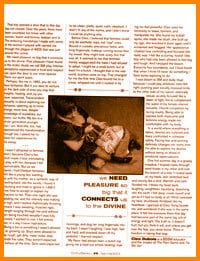The Canadian distributor of the lesbian sex magazine On Our Backs has covered up photos by internationally known photographer Fakir Musafar in the current issue.
It was either sticker over the three offending images of consensual bondage or have copies bound for Canadian newsstands destroyed.
“I’m shocked, I can’t believe it,” says managing editor Diana Cage. “I don’t understand how we’ve been catapulted back to Victorian times.”
The decision on the February/March issue was made by Disticor, the company that distributes On Our Backs and about 450 other mainstream and adult titles in Canada. It did so at the recommendation of the periodical advisory committee of Periodical Marketers Of Canada, a self-policing industry group which gives advice to periodical retailers, wholesalers and distributors on possibly obscene material.
“The committee reviews titles of a top shelf nature to recommend which titles might be a legal issue,” says Disticor CEO John Lafranier. “Wholesalers can’t look at all the titles on their own. They follow [committee advice] because there have been problems in the past with charges being laid.”
Lafranier says distributors and retailers can be charged with obscenity if someone complains to the police about one of their titles.
“I don’t want to be a censor. And I’m not a censor by following the committee recommendations. I put [the magazine] out. I put it out with a sticker,” says Lafranier, adding that Disticor hasn’t been told to censor material “for a long time.”
Musafar, whose much more explicit SM and fetish photo anthology Spirit+Flesh is widely available at Canadian bookstores, is pissed.
“I do not think my reputation helps get me around Canadian censorship – or should. This kind of censorship should not even exist. The system is just too judgmental, culturally biased and arbitrary,” says Musafar.
The Periodical Marketers Of Canada did not return Xtra’s telephone calls.
Ironically, HAF, the US-based publisher of On Our Backs, switched to a Canadian printer last year, hoping it could avoid border problems from Canada Customs.
“We had problems with them in 2002 because there were references to vaginal fisting in a fiction story,” says Cage. “At that point we realized it would be better to print in Canada to avoid Customs.”
Though On Our Backs only sells between 1,500 and 2,000 of its 25,000 bimonthly copies here, Cage says that support of Canadian advertisers make distribution in this country essential.
“It would be a financial hardship for us to not distribute in Canada,” she says.
So the magazine is toning down its content, with Cage reassigning a large chunk of the April/May just days before deadline.
“I’ve been working hard for a long time to make On Our Backs a realistic portrayal of dyke sex,” says Cage. “And now we have to police ourselves in this ridiculous way so we don’t disappear completely.”
HAF also publishes the mainstream title Girlfriends. Disticor called them with concerns this month about their current cover, featuring a photo of sexpert Tristan Taormino, topless but covering her nipples with her arms. In the end, the magazine was distributed without alteration.
“I noticed that on the list of titles that passed, there were [straight] titles like Barely Legal and Just 18,” says Girlfriends editor-in-chief Heather Findlay.


 Why you can trust Xtra
Why you can trust Xtra


